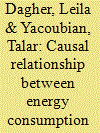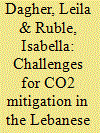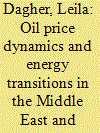|
|
|
Sort Order |
|
|
|
Items / Page
|
|
|
|
|
|
|
| Srl | Item |
| 1 |
ID:
116761


|
|
|
|
|
| Publication |
2012.
|
| Summary/Abstract |
This paper investigates the dynamic causal relationship between energy consumption and economic growth in Lebanon over the period 1980-2009. Within a bivariate framework, imposed on us due to data limitations, and in an effort to increase the robustness of our results, we employ a variety of causality tests, namely, Hsiao, Toda-Yamamoto, and vector error correction based Granger causality tests. We find strong evidence of a bidirectional relationship both in the short-run and in the long-run, indicating that energy is a limiting factor to economic growth in Lebanon. From a policy perspective, the confirmation of the feedback hypothesis warns against the use of policy instruments geared towards restricting energy consumption, as these may lead to adverse effects on economic growth. Consequently, there is a pressing need to revise the current national energy policy that calls for a 5% energy conservation target. Also, to shield the country from external supply shocks, given its substantial dependence on energy imports, policymakers should emphasize the development of domestic energy resources. Further, the most pertinent implication is that relaxing the present electric capacity shortages should be made a national priority, in view of its potential positive effect on the economy.
|
|
|
|
|
|
|
|
|
|
|
|
|
|
|
|
| 2 |
ID:
094251


|
|
|
|
|
| Publication |
2010.
|
| Summary/Abstract |
Similar to other developing countries the electricity sector in Lebanon is monopolized by a vertically integrated public utility, Electricite Du Liban (EDL). EDL's supply is characterized by frequent and lengthy power cuts that have given rise to an alternative, informal, and unregulated backup sector, which serves to satisfy electricity demand during the extended blackout periods. This paper examines the evolvement of the backup sector and its related CO2 emissions via the use of scenario analysis. The economic and energy policy implications of each scenario are discussed and a number of policy options are presented to ensure that the growth in CO2 emissions is contained. Results clearly indicate that the backup sector plays a critical role in the success of any greenhouse gas mitigation commitment undertaken by Lebanon. A clear strategy on dealing with this sector needs to be devised simultaneously if not prior to any climate change policy at the national level.
|
|
|
|
|
|
|
|
|
|
|
|
|
|
|
|
| 3 |
ID:
192794


|
|
|
|
|
| Summary/Abstract |
We collect primary data by conducting a survey on 931 Lebanese households who work in seven pre-specified sectors across all Lebanese governorates. The survey was supplemented by five groups of Key Informant Interviews that helped in formulating the survey questionnaire and in validating and interpreting the data from the survey. This paper aims to provide an assessment of the extent of energy poverty in Lebanon against comparators. Energy poverty is gauged using three indicators: (i) percentage of households able to keep their household warm, (ii) percentage of income spent on energy and, (iii) the low-income high-cost approach. Our findings uncover that Lebanese households suffer from the highest prevalence of energy poverty amongst comparators and, in absolute (rather than comparative) terms, a very high incidence of energy poverty. The findings underscore the dire need for measures that aim to mitigate the energy poverty of Lebanese households. We prescribe and discuss policy actions to alleviate the drastic situation which is further exacerbated by the ongoing crises. Our actionable policy recommendations are tailored to Lebanon’s specificities and cover the different relevant energy sectors; electricity, transportation, cooking, and heating.
|
|
|
|
|
|
|
|
|
|
|
|
|
|
|
|
| 4 |
ID:
176719


|
|
|
|
|
|
|
|